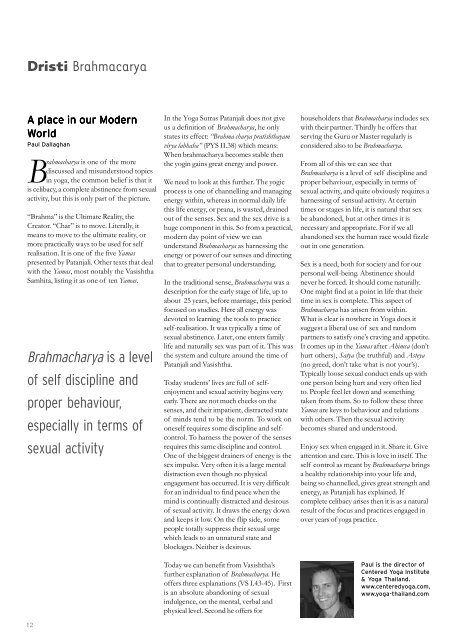You also want an ePaper? Increase the reach of your titles
YUMPU automatically turns print PDFs into web optimized ePapers that Google loves.
Dristi Brahmacarya<br />
A place in our Modern<br />
World<br />
Paul Dallaghan<br />
Brahmacharya is one of the more<br />
discussed and misunderstood topics<br />
in yoga, the common belief is that it<br />
is celibacy, a complete abstinence from sexual<br />
activity, but this is only part of the picture.<br />
“Brahma” is the Ultimate Reality, the<br />
Creator. “Char” is to move. Literally, it<br />
means to move to the ultimate reality, or<br />
more practically ways to be used for self<br />
realisation. It is one of the five Yamas<br />
presented by Patanjali. Other texts that deal<br />
with the Yamas, most notably the Vasishtha<br />
Samhita, listing it as one of ten Yamas.<br />
Brahmacharya is a level<br />
of self discipline and<br />
proper behaviour,<br />
especially in terms of<br />
sexual activity<br />
12<br />
In the Yoga Sutras Patanjali does not give<br />
us a definition of Brahmacharya, he only<br />
states its effect: “Brahma charya pratishthayam<br />
virya labhaha” (PYS II.38) which means:<br />
When brahmacharya becomes stable then<br />
the yogin gains great energy and power.<br />
We need to look at this further. The yogic<br />
process is one of channelling and managing<br />
energy within, whereas in normal daily life<br />
this life energy, or prana, is wasted, drained<br />
out of the senses. Sex and the sex drive is a<br />
huge component in this. So from a practical,<br />
modern day point of view we can<br />
understand Brahmacharya as harnessing the<br />
energy or power of our senses and directing<br />
that to greater personal understanding.<br />
In the traditional sense, Brahmacharya was a<br />
description for the early stage of life, up to<br />
about 25 years, before marriage, this period<br />
focused on studies. Here all energy was<br />
devoted to learning the tools to practice<br />
self-realisation. It was typically a time of<br />
sexual abstinence. Later, one enters family<br />
life and naturally sex was part of it. This was<br />
the system and culture around the time of<br />
Patanjali and Vasishtha.<br />
Today students’ lives are full of selfenjoyment<br />
and sexual activity begins very<br />
early. There are not much checks on the<br />
senses, and their impatient, distracted state<br />
of minds tend to be the norm. To work on<br />
oneself requires some discipline and selfcontrol.<br />
To harness the power of the senses<br />
requires this same discipline and control.<br />
One of the biggest drainers of energy is the<br />
sex impulse. Very often it is a large mental<br />
distraction even though no physical<br />
engagement has occurred. It is very difficult<br />
for an individual to find peace when the<br />
mind is continually distracted and desirous<br />
of sexual activity. It draws the energy down<br />
and keeps it low. On the flip side, some<br />
people totally suppress their sexual urge<br />
which leads to an unnatural state and<br />
blockages. Neither is desirous.<br />
Today we can benefit from Vasishtha’s<br />
further explanation of Brahmacharya. He<br />
offers three explanations (VS I.43-45). First<br />
is an absolute abandoning of sexual<br />
indulgence, on the mental, verbal and<br />
physical level. Second he offers for<br />
householders that Brahmacharya includes sex<br />
with their partner. Thirdly he offers that<br />
serving the Guru or Master regularly is<br />
considered also to be Brahmacharya.<br />
From all of this we can see that<br />
Brahmacharya is a level of self discipline and<br />
proper behaviour, especially in terms of<br />
sexual activity, and quite obviously requires a<br />
harnessing of sensual activity. At certain<br />
times or stages in life, it is natural that sex<br />
be abandoned, but at other times it is<br />
necessary and appropriate. For if we all<br />
abandoned sex the human race would fizzle<br />
out in one generation.<br />
Sex is a need, both for society and for our<br />
personal well-being. Abstinence should<br />
never be forced. It should come naturally.<br />
One might find at a point in life that their<br />
time in sex is complete. This aspect of<br />
Brahmacharya has arisen from within.<br />
What is clear is nowhere in Yoga does it<br />
suggest a liberal use of sex and random<br />
partners to satisfy one’s craving and appetite.<br />
It comes up in the Yamas after Ahimsa (don’t<br />
hurt others), Satya (be truthful) and Asteya<br />
(no greed, don’t take what is not your’s).<br />
Typically loose sexual conduct ends up with<br />
one person being hurt and very often lied<br />
to. People feel let down and something<br />
taken from them. So to follow these three<br />
Yamas are keys to behaviour and relations<br />
with others. Then the sexual activity<br />
becomes shared and understood.<br />
Enjoy sex when engaged in it. Share it. Give<br />
attention and care. This is love in itself. The<br />
self control as meant by Brahmacharya brings<br />
a healthy relationship into your life and,<br />
being so channelled, gives great strength and<br />
energy, as Patanjali has explained. If<br />
complete celibacy arises then it is as a natural<br />
result of the focus and practices engaged in<br />
over years of yoga practice.<br />
Paul is the director of<br />
Centered Yoga Institute<br />
& Yoga Thailand.<br />
www.centeredyoga.com,<br />
www.yoga-thailand.com

















